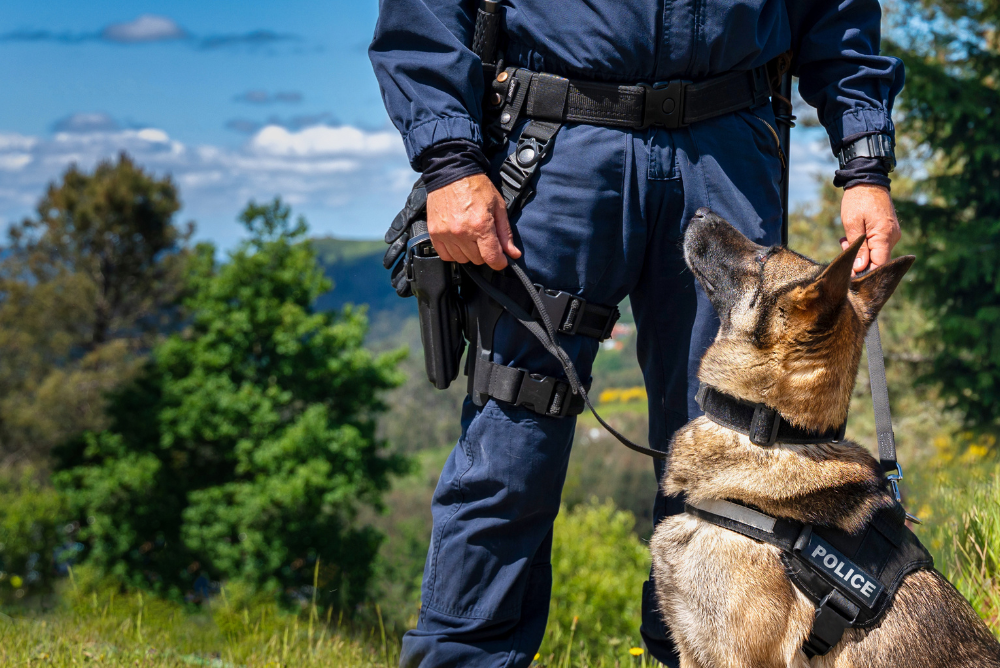
Trained police dogs can smell when marijuana is present. Their signal to the scent is often enough for police officers to conduct a search of a car without a warrant, but that is about to change in parts of Florida.
What changed, and what does it mean for Floridians?
A Drug Scent Leads to an Arrest
In 2020, Stephon Ford was taking a ride in a Lyft in Groveland, Florida, when the driver was pulled over by a police officer. The officer stopped the driver for speeding and tag lights that were not working. After the officer noticed the passenger seemed nervous and agitated, he called for a trained drug-sniffing dog to inspect the vehicle. Upon inspection, the dog, named Polo, signaled at the car indicating that the smell of marijuana was present.
The signal from the dog granted the officer the right to search the vehicle. Inside, the officer found seven mason jars filled with marijuana, along with baggies of crack cocaine, ecstasy, and methamphetamine, as reported by CBS 12 News.
The drugs belonged to Ford. He was charged with drug possession and was arrested.
Related: If YouŌĆÖre Arrested for a Crime, Immediately Take These 6 Steps
Defense Seeks to Dismiss Evidence
FordŌĆÖs defense team aimed to fight the charges and filed a motion to dismiss the evidence against him. Their motion argued the drugs found were not permissible as they were found unfairly.
FordŌĆÖs team argued that a drug-sniffing dog could not be used to signal for the presence of illegal drugs because they cannot tell the difference between legal, medical marijuana and illegal marijuana, per the Tampa Bay Times.
The circuit judge refused the request. Ford was sentenced to 68 months in prison, but his legal team did not stop fighting for his case.
Related: What Would Federal Reclassification of Marijuana Mean in Florida?┬Ā
An Appeal Could Change Procedure
FordŌĆÖs defense team appealed the decision and brought the case before the 5th District Court of Appeal in Lake County. A three-judge panel reviewed the case and issued a ruling that will change the way drug-sniffing dogs are used in the future.
The appeals court agreed with Ford.
ŌĆ£At the time when Polo alerted to a target substance in the Lyft vehicle, the police officers had no way of knowing whether Polo had detected an illegal substance (marijuana, cocaine, heroin, or methamphetamines) or a legal substance,ŌĆØ wrote Chief Judge James Edwards in the opinion. ŌĆ£Whether the substance Polo smelled was legal or illegal was not readily apparent, and thus his alert, alone, could not provide the probable cause needed to justify a warrantless search.ŌĆØ
The ruling could change the way things are done in the future in the 5th District of Florida, which includes areas in Daytona Beach, Jacksonville, and Ocala. Signals by drug-sniffing dogs may no longer be the sole reason for a car being searched.
Another judge agreed with Judge Edwards, but also noted that drug-sniffing dogs could still be used. In his opinion, Judge Jordan Pratt said, ŌĆ£An undifferentiated alert can supply probable cause when combined with an officerŌĆÖs questions ruling out the presence of lawful cannabis. Officers easily can be trained to ask such questions in conjunction with a dogŌĆÖs undifferentiated alert.ŌĆØ
The decision comes after another ruling by the full 5th District Court of Appeal made in August 2024 that said police officers could not use the scent of marijuana as the sole basis to search a car and arrest a man.
The new ruling adds to the complexity of when officers are legally allowed to search a vehicle and if the evidence they find can be used in court, but it did not change the outcome of FordŌĆÖs case.
Related: Facing Florida Drug Possession Charges: 6 Things You Need to Know
An Appeal Does Change Conviction
While the appeals court agreed that a drug-sniffing dog cannot tell the difference between legal and illegal marijuana and should not be able to trigger a car search, the court upheld FordŌĆÖs conviction.
Under what is known as a ŌĆ£good faithŌĆØ exception, the judge followed what was legal precedent at the time of FordŌĆÖs arrest and upheld FordŌĆÖs conviction and sentencing. While his case may change the future of how police stops are conducted, Ford will still need to serve his time behind bars.
Related: 6 Signs You Need a New Attorney
Talk to a Criminal Defense Attorney
Laws are always changing and evolving. If you have been arrested, make sure you talk to a drug possession attorney who keeps up with changing legal rules. An informed attorney can do their best to fight on your behalf and lead to the best possible outcome.
If you have been charged with a crime, TJ Grimaldi is here to help. Review your case during a free consultation and see how TJ can fight for your interests. Start making your defense plan today. Request your free consultation or call 813-226-1023.


